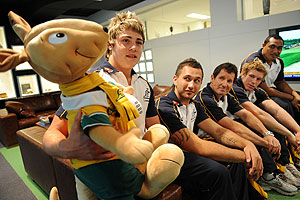
New Wallabies signings James O'Connor, Quade Cooper, coach Robbie Deans, David Pocock and Sekope Kepu at ARU headquaters, Sydney. (AAP Image/Dean Lewins)
It’s not been a good week and a bit for Australia’s national teams. While the Wallabies are riding their annual international form roller-coaster, our cricket team is taking it’s time to get into the one-day series against England over in Blighty.
And, as Murphy’s Law dictates, just as I announced my presence on the Socceroos World Cup bandwagon, it was ripped out from underneath me by an inferior goal difference, due mainly to a dud Pim Verbeek plan in the first game.
Therefore, it’s back to rugby this week, as I search for a win somewhere. Anywhere.
Going into the Ireland Test, the Wallabies had to defend some selections, with plenty of pundits suggesting changes in certain positions. Without doubt, squad injuries saved several players from the axe after the loss to England.
The ‘back three’ unit was certainly one area in which change was expected, but save for Adam Ashley-Cooper coming onto the left wing for the injured Digby Ioane, fullback James O’Connor and right winger Drew Mitchell held their spots.
Ashley-Cooper, thought to be entrenched as a fullback at the end of last year, is quickly falling back into that Mr Fix-it role that he used to play regularly, but neither he or Wallaby coach Robbie Deans seemed overly worried in the lead-up.
Deans was non-committal about where Ashley-Cooper now fits, explaining “most of his recent rugby has been on the wing so there’s a fair bit of continuity to that end, but I’m sure it won’t be the last position you will see him in this year.”
Ashley-Cooper trotted out the line that Deans has wanted to instil in the Wallabies back three for some time, “I see it as three fullbacks rather than winger, fullback, winger.”
So knowing this is what Deans wants, and with a key player in this combination seemingly on board, I decided to watch the Test against Ireland with a close eye on this ‘three fullbacks’ arrangement.
As a lead-in, I kept an eye on the New Zealand-Wales Test with this same focus, as the All Blacks back three would probably sit as the benchmark at where Deans wants the Wallabies’ equivalents to operate.
The game didn’t really lead itself to a lot of counter-attacking rugby, but what was obvious is that there was definite ‘unity’ between fullback Mils Muliaina and Cory Jane and young Zac Guildford on the wings, despite not playing together the previous week.
On the kick returns, the three of them were almost always back in position ready early, and the ball was rarely returned without at least two of them playing a part. If the return was via an All Black kick, you could be assured the other two were leading the chase.
I was quite interested to see if the Australian back three had the same sort of harmony.
Sadly, they did not.
It all started so promisingly, too. The first kick return for the Wallabies saw Mitchell claim the catch, who then passed to O’Connor in midfield, who himself had Ashley-Cooper in support. Great stuff, just what I wanted to see.
Not a minute later though, O’Connor was penalised for advancing on Ashley-Cooper’s clearing kick; the first of two of these inexcusable Wallaby infringements for the night.
For the rest of the first half the back three rarely combined, mainly due to Bryce Lawrence’s incessant and infuriatingly pedantic refereeing; they didn’t get much chance to. In reality though, the back three rarely played in their named formation anyway.
O’Connor seemed to be spending most of his time on the left wing, with Ashley-Cooper playing fullback. And O’Connor seemed to prefer linking with good mate Quade Cooper anyway.
The lack of obvious linkage between the back three was already worrying. They weren’t so much playing as ‘three fullbacks’ but as two wingers and James O’Connor.
After the break, and with shuffling of the backline required after outside centre Rob Horne stayed off with a gluteal complaint, the back three combination saw no improvement. Ashley-Cooper was now playing at outside, O’Connor was formally moved to the wing, and Kurtley Beale was at fullback for the second half.
In Beale and O’Connor, we now had a former flyhalf/inside centre only this year converted into a fullback, and a still developing inside centre/fullback playing on the wing.
Not long after half time Beale bombed a near-certain try with a wasted grubber kick to the in-goal that ignored a two-on-one overlap. But the unmarked man was Matt Giteau; where was Mitchell?
Shortly after that, O’Connor was rightly penalised for taking out the legs of Irish winger Andrew Trimble in the air, which begged the question that if O’Connor was there to crudely take Trimble’s legs from under him, why wasn’t he contesting the high ball?
With Mitchell having another off night, the back three was a decent barometer on how disjointed the rest of the Wallaby backline looked. Apart from Luke Burgess servicing Cooper well all night, and Ashley-Cooper running strongly in midfield as he always does, there was little to like.
In Cooper, and especially Giteau, O’Connor and Beale, the Wallabies were way too lateral, and overplayed the one-off runners.
There was little or no backline play from scrum-half all the way out to the wings, and there were no clear signs anyone knew what anyone else was doing. Smarter, fresher, and quicker defensive lines than Ireland will demolish this sort of ‘attack’ with ease and regularity.
Captain Rocky Elsom was spot on in the post-match, saying that the Wallabies had “a lot of work to do” in the three weeks before their first Tri-Nations match against South Africa.
Midfield combinations will rightly be examined and questioned, but I’d be looking at who can properly fill the ‘three fullbacks’ function as a matter of priority.





























































































